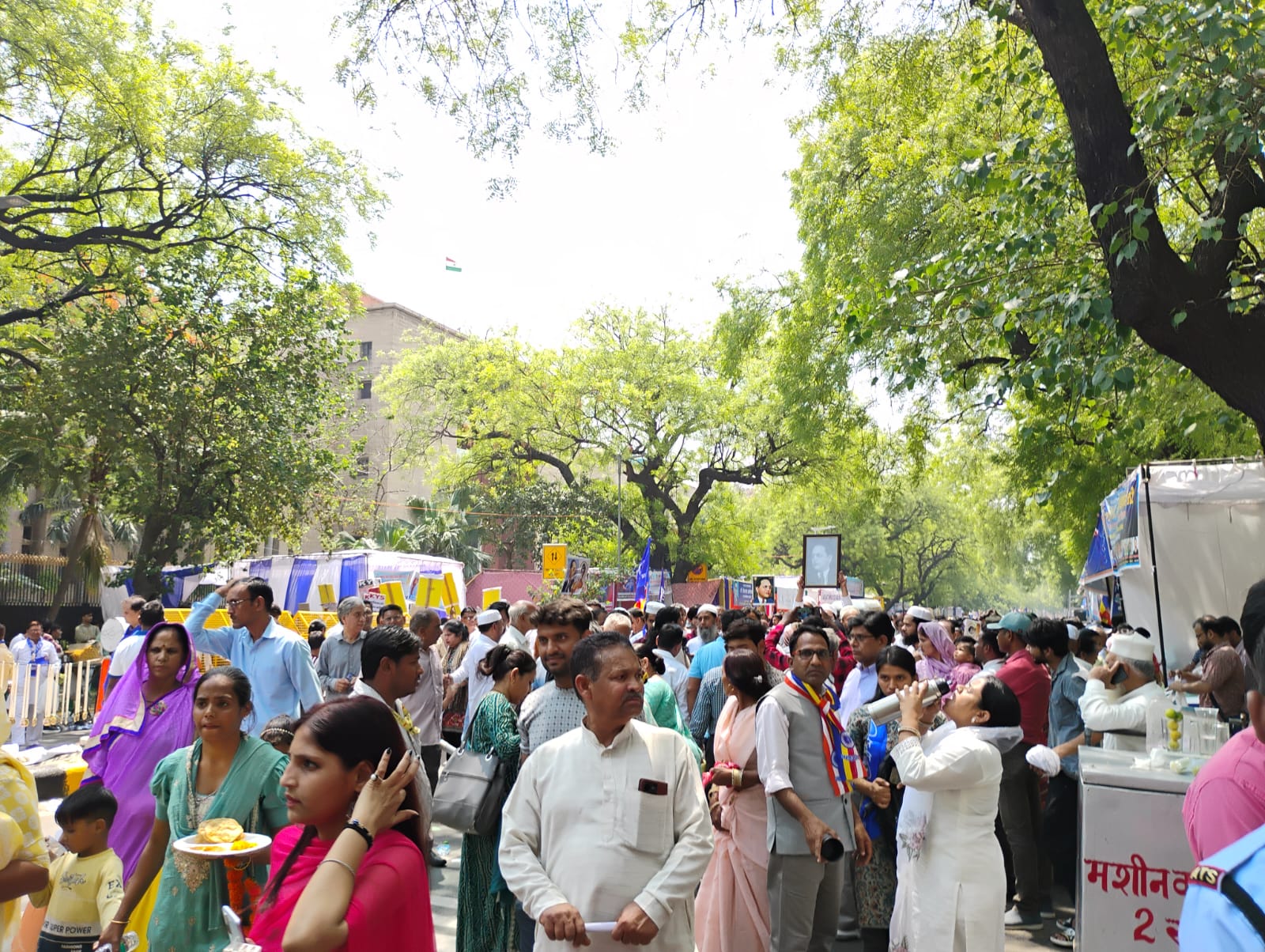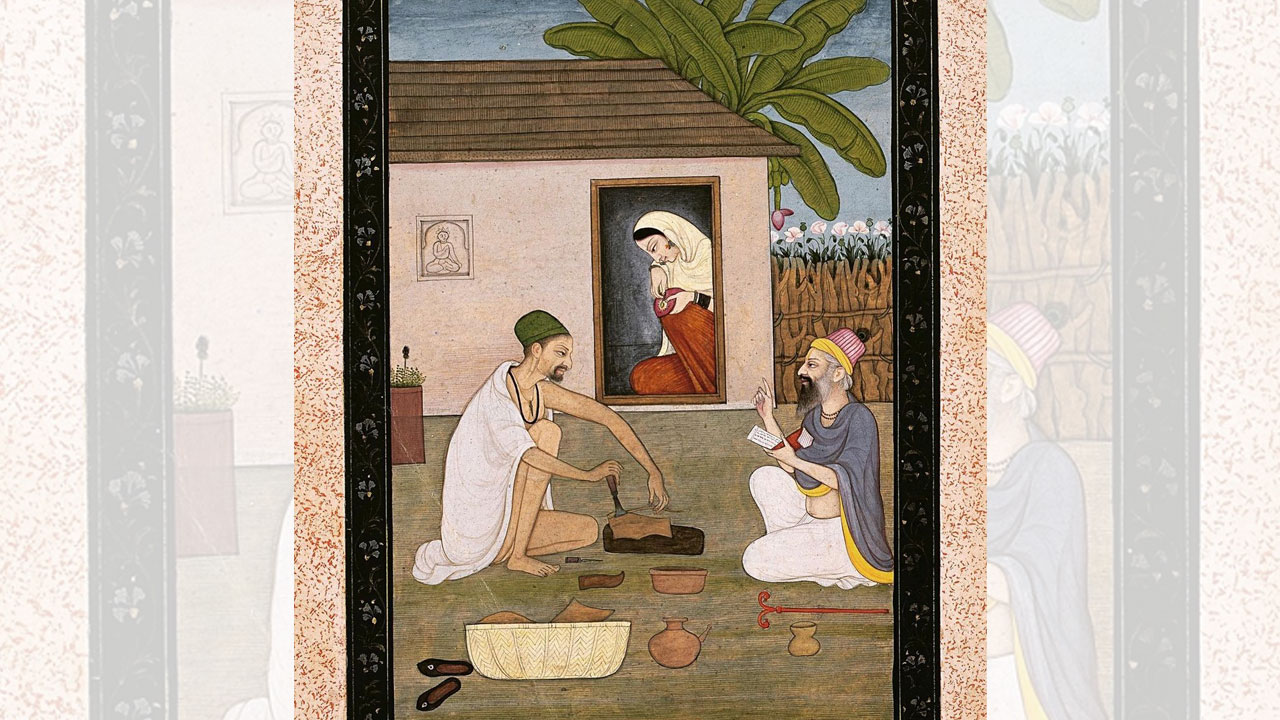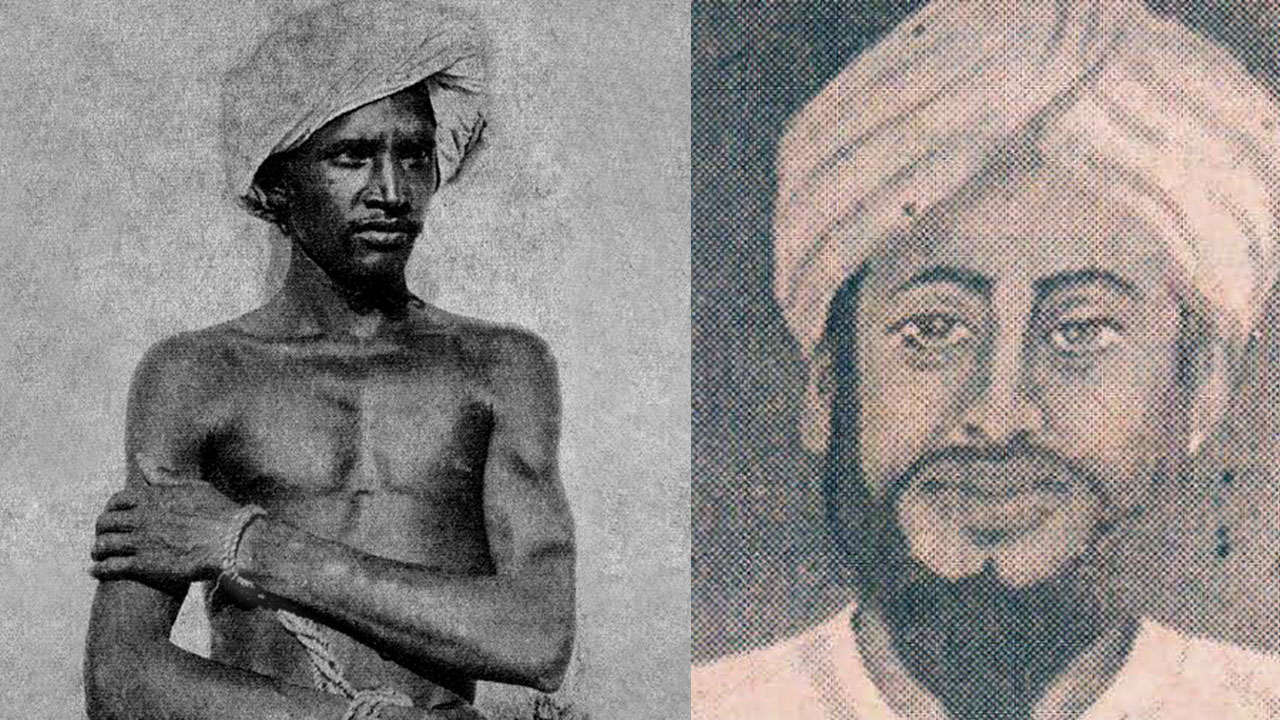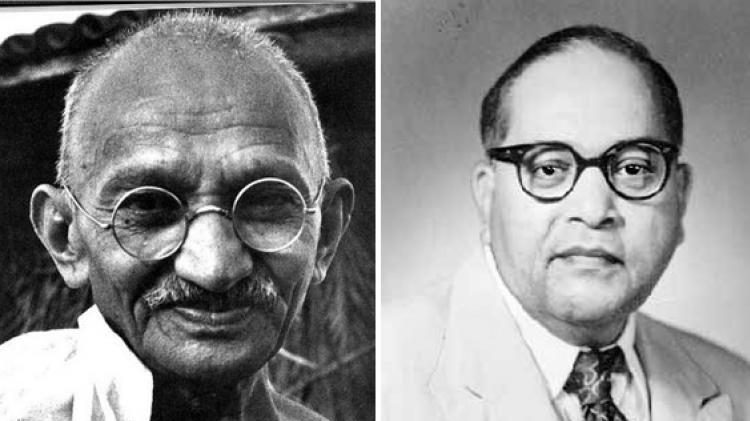
Backed by the BJP, the RSS and its ancillary organizations have launched a concerted attempt to inject the poison of communal hatred into society and have been running a “Ghar Wapsi” (homecoming) re-conversion campaign, a new form of the Shuddhi movement. They have launched a jihad against the Dalits and Tribals embracing Islam or Christianity. This campaign has emerged as a new, potent threat to national integrity and unity. On the one hand, the BJP is trying to get a foothold among the Dalits using the name of Ambedkar, while on the other hand, by launching a campaign against conversions and for Hinduizing converted Tribals and Dalits, it is going against the grain of Ambedkar’s firm belief that emancipation of the Dalits lay in abandoning the Hindu religion. The Hindutvavadi political and so-called cultural organizations like the BJP and the RSS, which do not tire of describing themselves as nationalists, forget that Ambedkar was for annihilation of caste. Anyone with even an elementary knowledge of history and politics knows that the caste system, which enjoys the patronage of Hinduism, is at the root of the practice of untouchability and justifies the inhuman discrimination against Dalits. That is why Ambedkar saw quitting Hinduism as the way for the emancipation the Dalits. But the Hindutvavadi organizations, despite being well aware of these facts, are trying to ignore this basic truth in their political ideology. It is the responsibility of every true nationalist to expose the saffron conspiracy, which is aimed at pitting Dalits and the Tribals against Muslims and Christians. In fact, exposing this conspiracy is imperative if we are to protect our country from being torn asunder. Today, Ambedkar has become the symbol of Dalit identity. Given the central government is trying to divert attention from the basic socio-economic ills plaguing the country by raising unwarranted issues like conversions of Dalits and Ghar Wapsi, we need to revisit the exchanges or disputes between Ambedkar and Gandhi on the issue of religious conversions. This is also necessary to puncture the saffron propaganda that the Congress and Gandhi were anti-Hindu and that the RSS and the BJP are the only true saviours of the majority community.
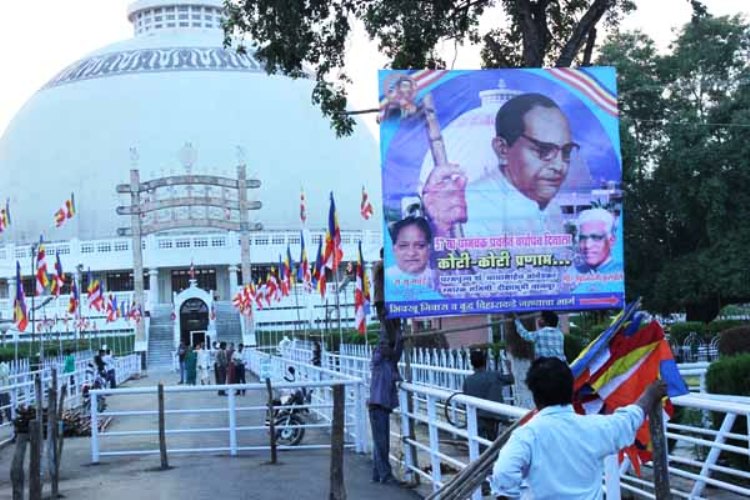
Ambedkar’s well-thought-out conversion
All of us know that on 14 October 1956 Ambedkar embraced Buddhism with lakhs of his followers in Nagpur. This fact needs to be remembered by all Dalits and the Hindus, for it is of great consequence to them. A mature thinker and Dalit leader like Ambedkar would not have switched to Buddhism on the spur of the moment. This backdrop of this conversion is the exploitation and oppression of the Dalits for centuries, Ambedkar’s disillusionment with the Hindu reformists and Gandhi’s adamant attitude. All these factors had forced Ambedkar to quit the Hindu religion. Despite being aware of Ambedkar’s formidable following among the Dalits, Gandhi could never really reconcile himself to the fact that Ambedkar was the unquestioned leader of the Dalits. Gandhi’s refusal to accept Ambedkar as the representative of the Dalits and his 1932 fast-unto-death against a separate electorate for Dalits challenged the self-respect of Ambedkar and the Dalits. Next, as part of a strategy to obliterate the distinct identity of the Dalits, Gandhi and the Congress started using the word “Harijan” to denote the Dalits. This left Ambedkar with no option but to end his association with the Hindu religion. But all this should not be seen as merely a clash of egos. Ambedkar had arrived at the decision of quitting Hinduism after a long and serious study of the realities of the life of Dalits.
Like his father and his other family members, Ambedkar had great reverence for Hindu saints and in the evening of his life, he was even working on a book on them. But death intervened. He did quit Hinduism but he was never an atheist like Bhagat Singh. Bhagwandas has claimed in one of his articles that in the conference of Dalits convened in Bombay after his return from Britain, where he had been to study for his PhD, Ambedkar was requested not to embrace any other religion, especially Islam, as it would lead to an alien culture dominating the Aryan culture of this country.[1] One cannot vouch for the truth or otherwise of Bhagwandas’ claim but what we know for a fact that Ambedkar had talked about quitting Hinduism publicly for the first time at a convention of the Untouchables held in Yevla (Maharashtra) on 13 October 1935. That was after the 1932 Poona Pact. It is clear that while Ambedkar might not have been against conversions of Dalits but he was not for it either. He had even led an agitation demanding that Dalits be allowed to enter the Kalaram Temple in Nasik.

It is apparent that the Poona Pact had much to do with Ambedkar’s decision to break free from the Hindu religion. It was due to Ambedkar’s intense efforts that the British government, under the Communal Award of 1932, agreed for separate representation for the Dalits. However, Gandhi outmanoeuvred Ambedkar by embarking on a fast-unto-death against it and Ambedkar was forced to agree to a joint electorate, with some constituencies reserved for the Dalits. Gandhi did not stop at that. To nip the emerging independent political consciousness among the Dalits in the bud, he launched an aggressive movement for the emancipation of the “Harijans”. Ambedkar’s Dalit perspective saw in Gandhi the tallest Hindu leader after Shankaracharya. Gandhi was about to extinguish the spark of independent consciousness of the Dalits in the name of the Harijan movement. Rather than compromise his Dalit consciousness and self-respect, Ambedkar decided to quit the Hindu religion. It is pertinent to note here that at the Yevla conference, Ambedkar blamed the Hindu reactionary leadership, which had failed the movement of the Dalits demanding their rights as members of the Hindu community, for his decision.[2] Ambedkar, who had earlier agitated for the Dalits’ right to enter Hindu temples, said from the dais that the money, time and effort spent on that movement had gone waste.
Citing the antiquity and survival instinct of the Hindu religion as a mark of its greatness, Sarvapalli Radhakrishnan and Gandhi showered profuse praises on it. It seemed as if they were advising Dalits not to convert to any other religion given the proven greatness of Hinduism. Writing in Young India (24 November, 1927) Gandhi said, “After all, there is something in Hinduism that has kept it alive up till now. It has witnessed the fall of the Babylonian, Syrian, Persian and Egyptian civilization. Cast a look around you – where is Rome and where is Greece? Can you find anywhere today the Italy of Gibbon or ancient Rome, for Rome was Italy?”[3] But Ambedkar, while conceding Gandhi’s point about the comparative antiquity of Hinduism, emphasized the difference between just being alive and living with dignity.[4] He stressed that Hinduism did not give the majority backward castes, including Dalits, the right to live with dignity. Brahmins had thrust ignorance and poverty on the Shudras.
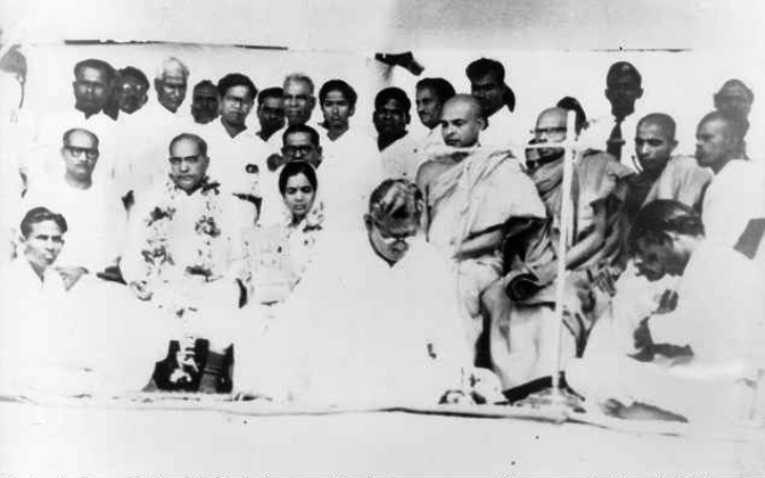
Gandhi believed that the Dalits’ emancipation was possible only if they continued in the Hindu fold. He did not blame the caste system for their plight. In fact, he was of the view that it was the caste system that had saved Hinduism from disintegration. Gandhi used to support the caste divisions on the ground that they were a natural division of work, approved by the Varnashram Dharma. Ambedkar considered the caste system not a division of labour but of labourers. He believed that inequality and discrimination were in the DNA of Hinduism and was of the strong view that Dalits cannot be emancipated if they remain in Hinduism. That was why, in a convention of Mahars in Bombay in 1936, he appealed to them to give up the Hindu religion and its rituals.
Sikhs eyed Ambedkar and co
Ambedkar’s decision to quit Hinduism and begin dialogues with representatives of other religions triggered a political tumult. The Hindus feared that it would dilute their numerical superiority. The Muslim communalists were lying in wait for such an opportunity. They had always insisted that Dalits should be seen as separate from the Hindus. This was their response when the Hindus boasted of their superior numerical strength. Although Ambedkar did not want his Dalit brothers to become pawns of Muslim politics, his move did make the Muslims more sympathetic towards the Dalits. Christian missionaries launched a fund collection drive in the Western nations, eyeing the vast Dalit population as potential converts to Christianity. Bhagwandas writes that the community which was most enthused by the announcement was the Sikhs because they thought that they would become the third biggest religious community in the country if Dalits took to Sikhism.[5] The possibility of an increase in the number of reserved seats in the legislatures must have encouraged the Sikh community leaders to bring Dalits into their fold.
Gandhi’s attitude towards the different communities drooling over Dalits seemed to be somewhat illogical. In 1940, in reply to a question from a Muslim, he said that untouchability was an internal problem of the Hindus; the savarna Hindus had committed this sin and they would have to atone for it. Gandhi was strictly against any interference of other religionists, as far as the question of untouchability was concerned. Gandhi insisted that the savarnas had the responsibility of banishing untouchability. However, Ambedkar had given up on Hindu social reformers and did not want to turn to savarna Hindus for bringing untouchability to an end. In any case, why would a self-respecting person wait for someone else to take the initiative to solve his problems?
At the root of the sharp differences between Ambedkar and Gandhi on the issue of conversion of Dalits were their different primary commitments. Gandhi said that he represented India as a whole but Ambedkar was not ready to accept him as a representative of Dalits. Ambedkar said that Gandhi was the most prominent protector of Hindu interests since Shankaracharya. Ambedkar was proven right when Gandhi opposed a separate electorate. Gandhi was not ready to accept any division of Hindus, even at the cost of Dalits. Conveying his firm resolve to go ahead with his fast-unto-death to protest the proposed separate constituencies, Gandhi wrote to the British prime minister warning him that he was an outsider and should not interfere in any issue that divides the Hindus. “In establishment of a separate electorate at all for ‘Depressed’ classes I sense the injection of a poison that is calculated to destroy Hinduism and to do no good whatsoever to ‘Depressed’ classes. You will please permit me to say that no matter how sympathetic you may be, you cannot come to a correct decision on a matter of such vital and religious importance to the parties concerned.”[6] Clearly, for Gandhi, the interests of the Dalits were secondary. His first priority was saving Hinduism from the so-called destruction. On the other hand, Ambedkar considered upliftment of the Dalits his foremost responsibility. He had nothing to do with Hinduism.
Religion, spirituality and social inequality
Just as their respective commitments defined Gandhi and Ambedkar’s attitude towards conversions, they had different views on religion. Gandhi saw conversion as a fruitless exercise while for Ambedkar it was the path to the emancipation of the Dalits. After all, Dalits were seeking freedom from social and economic inequalities and biases. Ambedkar had reservations about Gandhi’s concept of religion being a private affair between man and the Almighty. He also did not agree with the contention that religion does not have any social aspect.[7] Ambedkar held that the theological aspect of a religion is secondary. What is of primary importance is its customs, traditions and rituals. Ambedkar felt that the attitude of the Hindus towards Dalits was not determined as much by the theology of Hinduism as by its rules of conduct and behaviour. According to him, life and its preservation was the gist of all religions. He insisted that even the religions of barbaric societies were not confined to superstitious rituals but were related to the exercise of survival. He said that the gist of the modern religions was also the same. “It is true that the real gist of the religion has been lost in the dazzle of science in the modern society and has passed out from our memory. But it is an incontrovertible fact that in the modern society also, life and its preservation is the gist of religion.”[8]
Clearly, Hinduism could never be the religion of Dalits in terms of Ambedkar’s definition of religion – for the Hindu caste system deprived the Dalits of their right to live with dignity. The Manusmriti prescribes harsh punishments for the Untouchables and the Shudras even for petty crimes. The Hindu caste system scrupulously deprives them of education, owning property and conducting cultural activities. Despite being a part of Hindu community, Dalits were forced to lead the life of an ostracized people. Ambedkar explained why Dalits cannot consider Hinduism their religion. As a representative of the Dalits, he wanted to know from the Hindus: “Does the Hindu religion accept them as human beings? Does it support their equality? Does it want to give them freedom? Does it strengthen the ties between Hindus and them? Does it teach Hindus that the Untouchables are one of them? Does it tell the Hindus that it is a sin to treat them worse than animals?”[9] Unfortunately, the Hindu community was not in a position to answer any of these questions in the affirmative. Given this situation, how could the Dalits have felt any affinity at all with the Hindus?

Unlike Gandhi, for Ambedkar, religion was not important because it made a person spiritual. It was important for him because it universalized social values; it deeply ingrained these values in the mind of a person and decided what a person would do for the wider social good. For Ambedkar, it was the social values of a religion that were the touchstone of spiritualism. The traditional concept of spiritualism had no meaning for him. Ambedkarite spiritualism was the one that prioritized social good over personal interests. As religion exercised much stronger control over people than any government or law, the Hindu upper castes could not have been forced to embrace Dalits and given up the biases against them by making a law proscribing caste system and untouchability, which enjoy the sanction of Hindu religion. Clearly, the social structure of Hindu religion was seething with the bacteria of untouchability and discrimination and no soap of Gandhian spiritualism could cleanse it. Hence, Ambedkar believed that the salvation of the Dalits lay in becoming the part of a religion that emphasized egalitarian social values.
Gandhi saw religion as the path to spiritual salvation and was a bitter critic of conversion of Dalits carried out with allurements. The fact is that Gandhi couldn’t bear to see Dalits, influenced by the service of Christian missionaries, converting to Christianity. He believed that it was not pure humanistic feeling but the disguised objective of increasing the number of their followers that was behind the service of the missionaries. He also saw foreign funds and governments behind the work of the missionaries. According to a report published in Young India, in a discussion with a Christian missionary Dr Siresol at Wardha, he straight away levelled the charge that missionaries do not do social service to serve humanity but to proselytize. “Why should not service be its own reward?” he wondered.[10] Gandhi might be charging the Christian missionaries with converting Dalits into Christianity by luring them with promise of material gain or facilities[11] but Ambedkar did not agree with him and his followers. Ambedkar said, “It is an indisputable fact that the Christian missionaries are trying to give healthy body to Indians and healthy mind to those taking refuge in them.”[12] He also sought to remind the Hindus that their religion had nothing to do with serving society, that it was dominated by customs and rituals. While Ambedkar praised the missionaries for their work in the fields of education and health, he wasn’t oblivious to the fact that it was mostly the savarnas who had benefited from the work done by the missionaries in the fields of education and health.[13] From the angle of Dalit Christians, he considered the money being spent by Christian missionaries in running schools, colleges and hostels as a waste. In a satirical tone, he said that Gandhi and his Hindu religion had no problem in accepting the material things and services offered by the missionaries but they did not want to give anything in return.
‘All religions are the same’
One argument used by Gandhi to oppose conversions was that all religions are equally true and none is superior to another. Hence, he believed that one should not switch to other religions. Rather, he said, one should follow one’s own religion with complete sincerity: That if one follows the basic tenets of one’s religion with complete faith and with a pure heart, one is sure to attain salvation. Clearly, this implied that as the caste system is a part of the Hindu religion, a Dalit, if he wants freedom from the cycle of rebirth, should fulfil the responsibilities enjoined on him by the caste system with a pure heart and with complete faith! But did Gandhi not know that the objective of the Dalit movement was not to attain spiritual salvation but salvation from the hell of untouchability and from the compulsion to perform a certain set of tasks? But as Gandhi considered all religions as different paths leading to the truth, his advice to Hindus, Muslims and Christians was to keep away from trying to convert other religionists to their faith and instead prove themselves as true followers of their own religion. He wrote in Young India, “If you are a Hindu, you should not pray that a Christian should turn a Hindu and if you are a Muslim, you should not pray that Hindus or Christians should become Muslims. Even in solitude we should not pray for anybody’s conversion. Instead, we should pray from the depths of our heart that one who is a Hindu should become a better and truer Hindu, one who is a Muslim should become a better Muslim and one who is a Christian should become a truer Christian.”[14]
Gandhi might have advocated for considering all religions equal and believing in Sarva Dharma Sambhav, keeping in mind his wider objective of forging Hindu-Muslim unity, but Ambedkar considered all religions equal only up to the point that all of them say that doing “good” is what makes life meaningful. But then, Ambedkar argued, different religions have their own concepts of “good” and they use different means to spread their version of “good”. Quoting Professor Tilley, Ambedkar argued that religion has played both positive and negative roles.[15] Some religions are violent, some are non-violent. Some religions make their followers human, others turn them into barbarians. Unlike Gandhi, Ambedkar did not believe that religions were paths leading to god. Say, for argument’s sake, all religions are paths that take one to god, still, “It cannot be said that all religions will definitely take one to god and neither can it be said that any path, even if it leads to god, is the right one.”[16]
Here, you can see a marked difference between the approaches of Gandhi and Ambedkar. Gandhi might have believed more in the purity of the means of attaining an objective than attaining the objective itself but while talking of all religions as being different paths leading to god, he ignores the differences in the means. On the other hand, Ambedkar, who was considered a practical leader, wanted that the paths shown by different religions to be tested on the touchstone of morality. Ambedkar saw shrewd diplomacy in Gandhi declaring all religions equal. He thought that it was a stratagem for brushing aside the demands of the Dalits to examine the tenets of Hinduism on their merit. The theory of all religions being the same is the gift of comparative theology, which while seeking to debunk the illogical concept that the religions not founded by human beings were superior, brought the new religions, which cannot claim a divine origin, on a par with the ancient religions. A logical person like Ambedkar also did not accept that religions that were not created by men were superior to the others but he did not, to the extent that Gandhi did, consider all religions equal. Ambedkar believed that religions could be better or worse in terms of their merits. This justified the decision of the Dalits to quit Hinduism and embrace another religion that was better for them.
Ambedkar believed that conversion to another religion was the only way Dalits could be emancipated from their ostracization and the inferiority complex generated by it, provided, of course, that their new religion was free from the boycott, indifference and biases which they faced in Hinduism. He said that once the Dalits started believing that they are equal to others, the ingrained inferiority complex would wither away.[17] Ambedkar took great pains to emphasize that Dalits could be freed from their alienation by becoming part of a religion free from the concept of caste. He said that once Dalits started believing in the god of the new religious community, the community would start considering them its members and that would benefit the Dalits just as a family would. He said blood relation was a mandatory condition for becoming the member of a community and now, commonality of religious beliefs has taken the place of blood relation. Ambedkar considered it important for Dalits to become members of a community that believed in egalitarianism because that would secure them the support of a group in fighting the oppression by the Hindus. Remaining in the Hindu religion was a double blow to the Dalits. They were ostracized by the savarna Hindus while non-Hindus maintained a distance from them because in the eyes of the non-Hindus they were Hindus. Ambedkar told Dalits that they would have to quit Hinduism for their emancipation. Otherwise, they would never get justice. Ambedkar considered justice as something that only a community could give to its members; the Untouchables would never get justice, as Hindus did not consider them part of their community. In Hinduism, justice is a privilege that only savarnas enjoy.
Ambedkar saw the futility of the attempts by some Dalits to break free from their Dalit identity by changing their names or by not disclosing their caste. It was not that Ambedkar, like Shakespeare, was asking “What’s in a name?” He was in favour of a new name for Dalits only if it belonged to “a community other than the Hindus. It should be such that Hinduism cannot distort or deride it.”[18] The experience shared by Dalit autobiography writers in Hindi and other languages has been that if Dalits think that they can win respect by keeping savanrna-like names, they are only chasing a mirage because by hook or by crook, the Brahmanvadis will discover their caste and deride them for keeping savarna names.
On Shuddhi and Ghar Wapsi
In the context of the Shuddhi movement launched by the Arya Samaj and its contemporary saffron form called Ghar Wapsi, it is important for not only the Dalits but for all Indians to understand that neither Gandhi nor Ambedkar was a supporter of the Shuddhi movement. As we have seen earlier, Gandhi did not believe that conversion induced by hunger or force or the lure of money was a change of heart and if such converted Hindus wanted to atone for their sham conversion and return to Hindu religion voluntarily, they need not undergo any process of “Shuddhi”.[19] Here, we must keep this possibility in mind that Gandhi might have been showed his disagreement with the Shuddhi movement to preserve and promote Hindu-Muslim solidarity.
Arya Samaj and some other organizations had launched the Shuddhi movement to counter the dilution of the numerical strength of Hindus with Dalits converting or being made to convert to Islam due to historical and socio-religious reasons. Some conservative Hindus had reservations about the movement as they believed that the Hinduism has an inherent strength that had always protected its religion and culture and there was no place for conversions or for propagation of religion in Hinduism. Ambedkar could not have agreed with this egotism of conservative Hindus. Quoting Prof Jolly and other scholars, Ambedkar argued that some time in the past, Hinduism must have been a proselytizing religion; otherwise, he said, it could not have spread to all parts of the Indian sub-continent.[20] However, he was aware that the Hindu religion had lost the capacity and will to propagate. Ambedkar also threw light on the factors that had led to Hinduism losing its proselytizing capacity. He held the varnashram system, and the caste system born of it, responsible for it. There is no place in Hinduism for a person of another religion or country because its rigid caste system leaves no space for them in the Hindu societal set-up. Ambedkar felt that there was scope for only mass conversion in Hinduism so that the converted people could form a new, separate caste. But communities rarely converted to another religion en masse those days.
Ambedkar saw Hinduism as a confederation of castes in which every caste was confined to within its boundaries. Clearly, such a regimented religion cannot assimilate a person from another faith. With the Hindu religion being a closed system, some reactionary elements used to raise the bogey of Shuddhi movement, etc to counter the numerical strength of the Muslims and the Islamization of the Dalits. Like Gandhi, Ambedkar too was not in agreement with the movement. Gandhi rejected the possibility of conversion of Dalits, hence he considered Shuddhi movement theoretically flawed and against religious harmony. Ambedkar believed that Hindu religion and society have no place for conversions. For different reasons, both believed that Shuddhi or Ghar Wapsi were untenable.
Commenting on the futility of the Shuddhi Movement, which was aimed at increasing the Hindu population of the country, Ambedkar said that numbers are not the determinants of the strength of a community. He wanted the Hindus to accept the fact that despite being less in number, the Muslims were able to overwhelm them. The secret of the strength of the Muslims did not lie in their numbers but in the superior organization of their society. Therefore, Ambedkar’s advice to the Hindus was that if they wanted to emerge powerful and build a bright future for Hinduism, they would have to strengthen the unity of the Hindu community. He said that eliminating the divisive caste system was an essential pre-condition for uniting Hindus – the more the number of castes, the more scattered and divided the Hindus would be. Ambedkar felt that the Shuddhi Movement would only serve to quicken the pace of disintegration of the Hindu community,[21] as on the hand, it would antagonize the Muslims and the person who was brought back into the Hindu fold through Shuddhi would be left out in the cold. He would quit his religion only to discover that he is a stranger in the socio-religious life of Hindus – his new religious community.
‘Dalits can’t understand theology’
Gandhi had a biased view on the wisdom and analytical capabilities of the Dalits. He did not think they were capable of objectively comparing the merits and demerits of different religions and arrive at a logical decision regarding the religion they should adopt. Discussing conversion to Christianity with Dr John Mott, chairman of International Missionary Council, Gandhi said, “Had you prayed for the welfare of the Harijans, I would have understood. But you make an appeal to become Christians to people who lack the capacity to understand what you are telling them. I am sure they are not capable enough to understand the differences between Jesus and Mohammed and Nanak and founders of other religions.”[22]
If here, Gandhi was referring to the philosophical aspects of religions or to theological debates, obviously, the majority Dalit community, which was largely unlettered, could not have grasped the complicated arguments and the fine reasoning on these complex issues. In any case, the toilers hardly have the time and the energy to indulge in intellectual hair-splitting. But then, the objective of the Dalits was not to master the spiritual and philosophical aspects of religions. Their problem was the socio-economic system of the Hindu religion that gave them the status of a second-rate citizen, which meant being considered less than a human being. The discourse of the lower classes today has little to do with Gandhi’s contention that the Dalits do not have the wisdom to analyze what is good and what is bad for them and choose a religion suited to them. On the other hand, Ambedkar believed that the conversion of Dalits was the first ever real conversion in the history where a people had decided to switch religions after evaluating their comparative merits and values.[23] Ambedkar wanted to know why Gandhi had doubts about the propriety of the Untouchables’ conversion.
For and against Christian missionaries
As we have already seen, Gandhi’s statements had the air of the Dalits’ self-proclaimed messiah. He was dead against Christian missionaries converting Dalits by providing them educational and medical services and luring them with the promise of pecuniary benefits. But Ambedkar saw in Gandhi’s stand a somewhat soft corner for the conversions done by Muslims. It is a historical truth that one of the objectives of the Muslims who invaded India was to forcibly convert the Hindu inhabitants of the country to Islam.[24] Even during the contemporary freedom movement, the plans of the Muslim communal elements to convert the Untouchables to Islam were no secret. At the 1923 annual session of the Indian National Congress at Kakinada, Dr Mohammed Ali, who was the chair, had presented a programme to this effect, which Ambedkar quoted as an example. Ambedkar wanted to know from Gandhi why he did not oppose the drafting of Untouchables into Islam with as much clarity and firmness that he did the conversion of Dalits by Christian missionaries. Gandhi could not have answered this question owing to his political compulsions. Ambedkar sheds light on the political compulsions and dual stand of Gandhi. Ambedkar knew very well that the answer to the question lay in the numerical strength of the Muslims. Being friendly with the Muslims was politically beneficial for the Congress and Gandhi, as otherwise the Muslims could have put hurdles in the path of the nationalist movement. But Gandhi should have realized that compromising with communal powers gave them the much-needed sanction and validity. We had to pay the price for it in the form of the Partition.
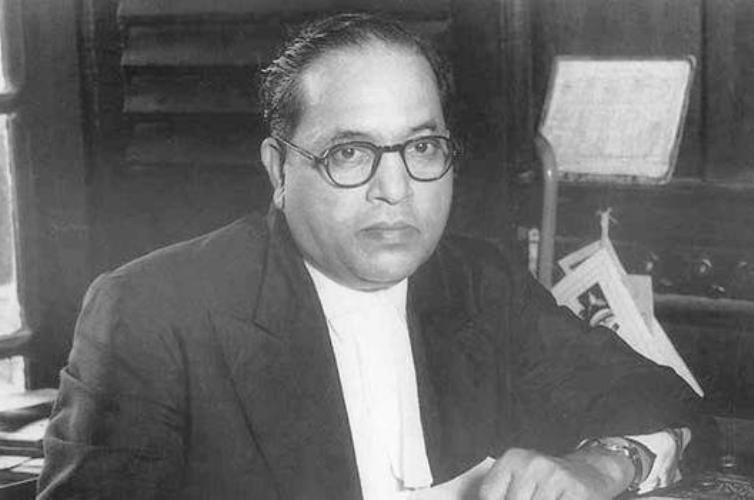
Ambedkar did criticize Gandhi for his double standards on conversion but it cannot be said that he (Ambedkar) preferred the conversion of Dalits into Christianity to their conversion into Islam. While Ambedkar regretted that the missionaries had adopted the wrong strategy on conversions in India by prioritizing Brahmins and other upper castes over the Dalits[25], he also condemned the caste-based inequality among the Christians. Thus, Ambedkar’s Dalit perspective neither gives any special treatment to Christianity and nor, unlike Gandhi, allows Muslims to proselytize. According to Ambedkar, one reason the missionaries could not get expected success in India was that in their initial days, they tried to draw Brahmins to Christianity by engaging them in debates over the merits and demerits of Christianity and Islam. The missionaries thought that once they succeeded in winning over the Brahmins, other castes would follow them into Christianity. This might have happened but what the missionaries forgot was that the Brahmins, who saw that the Chaturvarna system protected their interests, would never embrace a religion that sent out the message of brotherhood. That is why Ambedkar wanted the missionaries to stop luring the upper castes and concentrate on the Dalits instead.
But Ambedkar was not very hopeful of the Dalits gaining anything from becoming Christians. He had had a personal experience[26] that casteism lingered even among the converted Christians. That was because the missionaries gave them some concessions. They were allowed to continue worshipping idols and were not persuaded to give up their caste identities completely. That was why when the Hindus became Christians they took their castes along with them into their new religion. Thus, there were Dalit Christians and savarna Christians. The result was that the Dalit Christians were the victims of hatred of the savarna Christians and the savarna Hindus both. To make matters worse, they had to endure the boycott by their Hindu counterparts too.[27] Ambedkar observed that casteism was more rampant among the Christians in south India than in the north and that the Catholics were more casteist than the Protestants. Like Gandhi, Ambedkar too believed that embracing Christianity did not bring about any improvement in the social status of the Dalits and did not free them from the scourge of untouchability.[28] But while Gandhi, due to this and some other reasons, was strongly opposed to the conversion of Dalits, Ambedkar wasn’t. He only wanted the missionaries to correct their mistakes and he regretted, as has been mentioned earlier, that the missionaries did not pay adequate attention to the Dalits.
The aloof Dalit Christian
Ambedkar was disappointed to find that the Dalits who had converted to Christianity lacked Dalit consciousness and kept away from political and social movements and gatherings of the other Dalits aimed at liberating them from untouchability and other social evils.[29] Ambedkar blamed the basic character of Christianity for this attitude. The missionaries wanted their religion to be basically spiritual. The missionaries did not allow the converted Dalits to feel angry or resentful about their pitiable social status. They held the Dalits’ sins and not the social system responsible for their situation. On this point, there was no distinction between Hinduism and Christianity as far as the Dalits were concerned. While the former blamed the sins committed by them in their earlier births for their fate, the latter declared that it was the outcome of the sins of their ancestors.[30] Ambedkar saw that even after becoming Christians, the Dalits could not free themselves from the Hindu gods and goddesses. Though the Christians were the most educated and awakened community, they still had the tendency of discriminating against Dalits. Ambedkar believed that this was because of the lack of interaction between the educated and the uneducated Christians. While the educated Christians were converts from the savarna castes, most of the uneducated Christians were Dalits. Thus, there was a class difference between the savarna and the Dalits among the Christians too.
While Ambedkar believed that the lack of community consciousness among Indian Christians was due to the caste system, he also noted that they lacked the capacity and the will to join political struggles. That was because the Indian Christians of that era were living under the patronage of the foreign missionaries and the British government. While Ambedkar never questioned the patriotism of the Christians as Gandhi did, he found that they were cut off from the mainstream public life due to their obsequiousness.[31] Gandhi was opposed to the conversion of Dalits to Christianity as he believed that it would promote anationalism. He saw that the Indian Christians felt ashamed about being Indians and were not comfortable with the families they were born into. They had divorced themselves from the mother tongues and hated their ancestral religion and dresses. [32]
At the end, we should not forget that despite being a modernist and moralist, Ambedkar was never under the illusion that modern education and religious morality would end untouchability.[33] Ambedkar was too intelligent not to realize the limitations of the wisdom born of education. He took with a pinch of salt this claim of the intellectuals that once everyone became educated, untouchability would automatically vanish. He used to ask how many educated Brahmins had stopped believing in or practising untouchability. He knew only too well that the wisdom one acquired through education stood no chance against vested interests, and that untouchability was in the interest of the Brahmin. Similarly, Ambedkar could have called upon the believers in religious morality to realize that practising untouchability was morally untenable, but he believed that the force of religious morality would remain confined to within the four walls of one’s own community. Since the savarnas did not consider Untouchables part of their community, Dalits could harbour no hopes from Hindu religious morality.
Ambedkar thus held no bias against any religion, including Hinduism. He had irreconcilable differences with Gandhi on the issue of conversions. He saw the emancipation of Dalits in walking out of Hinduism. But he wanted that the Dalits to retain their independent identity. Therefore he wanted the Dalits to embrace a religion that accepted them as humans and didn’t make them a pawn of its own politics. Ambedkar’s finally concluded that Buddhism was the only religion that fit the bill on both these counts. Still, he made many necessary changes to Buddhism in keeping with the expectations and the needs of Dalits.
The differences between Gandhi and Ambedkar over the issue of conversions and related questions can show us the right path amid the din of the state-sponsored Ghar Wapsi campaign.
[1] Bhagwandas, Ambedkar Dharmantaran Ke Path Par (Ambedkar on the Road to Conversion), ed Devendra Swaroop, Manthan, Issue 1, Volume 5, p 60
[2] Ambedkar, Speeches and Writings, Education Department, Government of Maharashtra, 1979, Volume 1, p 80,
[3] Young India, 24 November 1927
[4]Ambedkar, ‘Annihilation of Caste’, Speeches and Writings, Education Department, Government of Maharashtra, 1979 Volume 2, p 66
[5] Bhagwandas, Ambedkar Dharmantaran Ke Path Par, ed Devendra Swaroop, Manthan, Issue 1, year 5, p 68
[6] Babasaheb Dr Ambedkar, Sampoorna Vangmay (The Complete Works of Ambedkar), Dr Ambedkar Prathishthan, New Delhi, volume 10, p 260
[7] ibid, p 337
[8] ibid, p 338
[9] ibid, p 343
[10] Quoted in Prof K.S. Vasvani, ‘Gandhiji Aur Dharmantaran Ki Samasya’ (Gandhiji and the Problem of Conversion), Devendra Swaroop ed, Manthan, Issue 1, Year 5, p 86
[11] Harijan; 1926, p 140-141
[12] ibid, p 392
[13] ibid, p 392
[14] Quoted in Prof K.S. Vasvani, ‘Gandhiji Aur Dharmantaran Ki Samasya’, Devendra Swaroop ed, Manthan, Issue 1, Year 5, p 76
[15] Babasaheb Dr Ambedkar, Sampoorna Vangmay, Dr Ambedkar Prathishthan, New Delhi, volume 10, p 336
[16] ibid, p 390
[17] ibid, p 350
[18] Babasaheb Dr Ambedkar, Sampoorna Vangmay, Dr Ambedkar Prathishthan, New Delhi, volume 10, p 351
[19] ‘Christian Mishanon Ke Sath Gandhiji Ka Samvad’ (Gandhiji’s Dialogue with Christian Missions), Quoted in Prof K.S. Vasvani; ‘Gandhiji Aur Dharmantaran Ki Samasya’; Devendra Swaroop ed, Manthan, Issue 1, Year 5, p 100
[20] Babasaheb Dr Ambedkar, Sampoorna Vangmay, Dr Ambedkar Prathishthan, New Delhi; volume 10, p 356-357
[21] ibid, p 359
[22] ‘Christian Mishanon Ke Sath Gandhiji Ka Samvad’, Quoted in Prof K.S. Vasvani, ‘Gandhiji Aur Dharmantaran Ki Samasya’; Devendra Swaroop ed, Manthan, Issue 1, Year 5, p 192
[23] Babasaheb Dr Ambedkar, Sampoorna Vangmay, Dr Ambedkar Prathishthan, New Delhi; volume 10, p 335
[24] In his book Pakistan Athva Bharat Ka Vibhajan (Pakistan or the Partition of India), Ambedkar has given a detailed historical account of the invasions of India and forced conversions by Muslim assailants and has argued that the myth of Hindu-Muslim unity in the past will not be able to stand the heat of solid historical facts. For detailed description, see Chapter 4 of the book titled Ekta Ka Vightan, Babasaheb Dr Ambedkar, Sampoorna Vangmay, Dr Ambedkar Prathishthan, New Delhi; volume 15
[25] Babasaheb Dr Ambedkar, Sampoorna Vangmay, Dr Ambedkar Prathishthan, New Delhi; volume 10, p 376-377
[26] In this context, Ambedkar has quoted a memorandum submitted by the Dalit Christians to the Simon Commission. In South India, Dalits Christians were deprecatingly addressed as pancham or periya. See Babasaheb Dr Ambedkar, Sampoorna Vangmay, Dr Ambedkar Prathishthan, New Delhi; volume 10, p 397-397
[27] Babasaheb Dr Ambedkar, Sampoorna Vangmay, Dr Ambedkar Prathishthan, New Delhi, volume 10, p 396
[28] Harijan, 25, Quoted in Prof K.S. Vasvani, ‘Gandhiji Aur Dharmantaran Ki Samasya’, Devendra Swaroop ed, Manthan, Issue 1, Year 5, p 86
[29] Babasaheb Dr Ambedkar, Sampoorna Vangmay, Dr Ambedkar Prathishthan, New Delhi, volume 10, p 416-417
[30] ibid, p 418
[31] ibid, p 421
[32] Young India, 20, Quoted in Prof K.S. Vasvani, ‘Gandhiji Aur Dharmantaran Ki Samasya’, Devendra Swaroop ed, Manthan, Issue 1, Year 5, p 96
[33] ‘Asprashyon Ko Chetavani’ (A Warning to the Untouchables), Dr Ambedkar, Sampoorna Vangmay, Dr Ambedkar Prathishthan, New Delhi, volume 10
Forward Press also publishes books on Bahujan issues. Forward Press Books sheds light on the widespread problems as well as the finer aspects of Bahujan (Dalit, OBC, Adivasi, Nomadic, Pasmanda) society, literature, culture and politics. Next on the publication schedule is a book on Dr Ambedkar’s multifaceted personality. To book a copy in advance, contact The Marginalised Prakashan, IGNOU Road, Delhi. Mobile: +919968527911.
For more information on Forward Press Books, write to us: info@forwardmagazine.in

